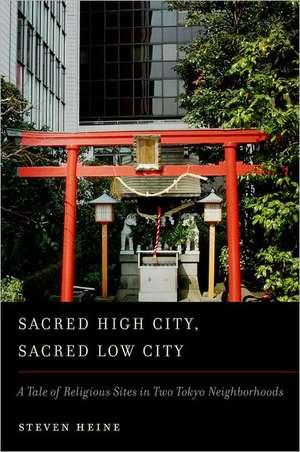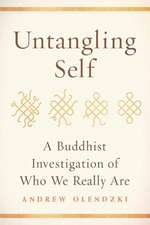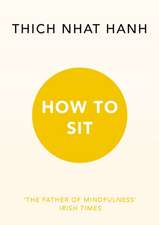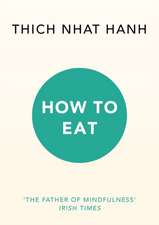Sacred High City, Sacred Low City: A Tale of Religious Sites in Two Tokyo Neighborhoods
Autor Steven Heineen Limba Engleză Paperback – 22 dec 2011
| Toate formatele și edițiile | Preț | Express |
|---|---|---|
| Paperback (1) | 241.54 lei 31-37 zile | |
| Oxford University Press – 22 dec 2011 | 241.54 lei 31-37 zile | |
| Hardback (1) | 641.55 lei 31-37 zile | |
| Oxford University Press – 22 dec 2011 | 641.55 lei 31-37 zile |
Preț: 241.54 lei
Preț vechi: 268.75 lei
-10% Nou
Puncte Express: 362
Preț estimativ în valută:
46.22€ • 48.08$ • 38.16£
46.22€ • 48.08$ • 38.16£
Carte tipărită la comandă
Livrare economică 03-09 aprilie
Preluare comenzi: 021 569.72.76
Specificații
ISBN-13: 9780199861446
ISBN-10: 0199861447
Pagini: 240
Ilustrații: 22 b&w halftones; 16 maps
Dimensiuni: 231 x 155 x 15 mm
Greutate: 0.34 kg
Editura: Oxford University Press
Colecția OUP USA
Locul publicării:New York, United States
ISBN-10: 0199861447
Pagini: 240
Ilustrații: 22 b&w halftones; 16 maps
Dimensiuni: 231 x 155 x 15 mm
Greutate: 0.34 kg
Editura: Oxford University Press
Colecția OUP USA
Locul publicării:New York, United States
Recenzii
These nuanced refinements to broadly accepted scholarship are without doubt a courageous and important contribution to the field of Japanese religions....This book is undoubtedly an important contribution to scholarship on Japanese religiosity, and will provide food for thought for both researchers and students of Japanese studies, but it will also appeal to the general public.
The contributions of Sacred High City, Sacred Low City cannot be overstated. Taking a significant step in moving Western scholarship beyond the gaze upon the Japanese other, Heine has offered a shift in paradigm that will change the direction of this field for years to come. Undergraduate and graduate courses on Japanese cultural and religious studies or on the confluence of contemporary religious practice and material consumption would be well served by adding this text to required reading.
Interesting... a fruitful reexamination of the conventional wisdom of what religion is and does in contemporary Japan.
Highly engaging and accessible... this is a significant contribution the the study of contemporary Japanese religiosity--particularly, but not exclusivley, urban religiosity...Sacred High City is a must-read for anyone with an interest in Japanese religions, sociology of religion, ritual spaces, or religion and modernization.
Heine questions the notion of 'born Shinto...die Buddhist,' a widely accepted understanding of Japanese religiosity. He proposes a new notion, 'Born Shinto...live Inari...die Buddhist,' adding that 'the use of the phrase 'live Inari,' refers to customs or practices habitually carried out within a worldview of myth and magic found in both Buddhist and Shinto contexts.
The contributions of Sacred High City, Sacred Low City cannot be overstated. Taking a significant step in moving Western scholarship beyond the gaze upon the Japanese other, Heine has offered a shift in paradigm that will change the direction of this field for years to come. Undergraduate and graduate courses on Japanese cultural and religious studies or on the confluence of contemporary religious practice and material consumption would be well served by adding this text to required reading.
Interesting... a fruitful reexamination of the conventional wisdom of what religion is and does in contemporary Japan.
Highly engaging and accessible... this is a significant contribution the the study of contemporary Japanese religiosity--particularly, but not exclusivley, urban religiosity...Sacred High City is a must-read for anyone with an interest in Japanese religions, sociology of religion, ritual spaces, or religion and modernization.
Heine questions the notion of 'born Shinto...die Buddhist,' a widely accepted understanding of Japanese religiosity. He proposes a new notion, 'Born Shinto...live Inari...die Buddhist,' adding that 'the use of the phrase 'live Inari,' refers to customs or practices habitually carried out within a worldview of myth and magic found in both Buddhist and Shinto contexts.
Notă biografică
Steven Heine, Professor and Director of Asian Studies at Florida International University, is an authority on Japanese religion and society, especially the history of Zen Buddhism and its relation to society in China and Japan. He has published over twenty books and dozens of articles, and has lectured extensively on these and related topics.














